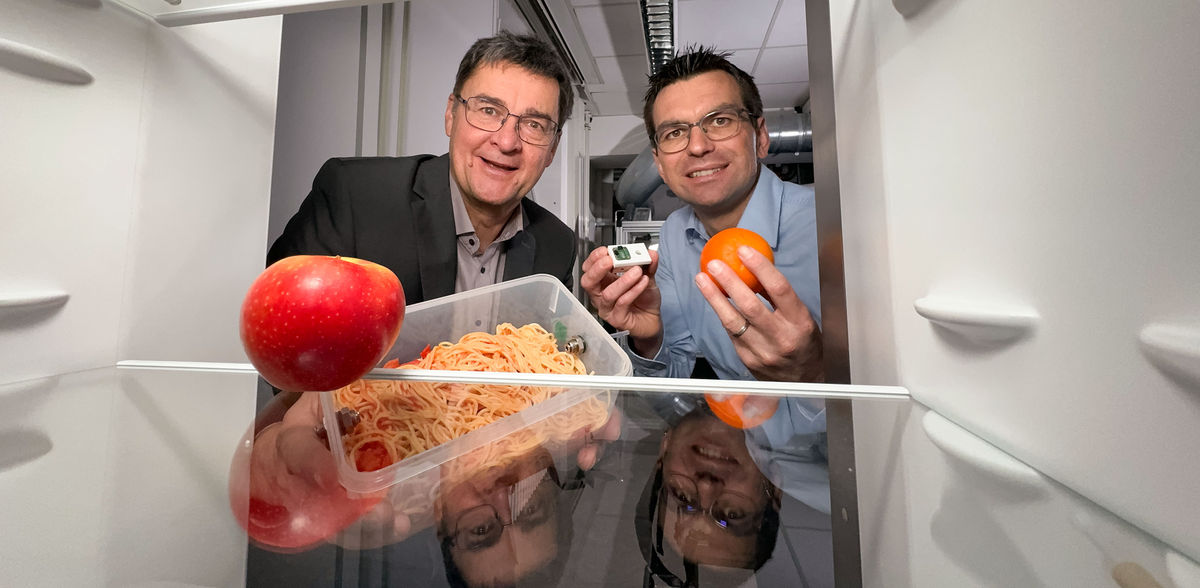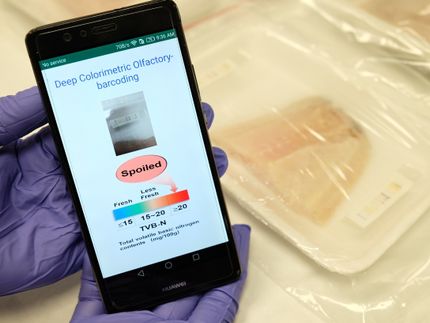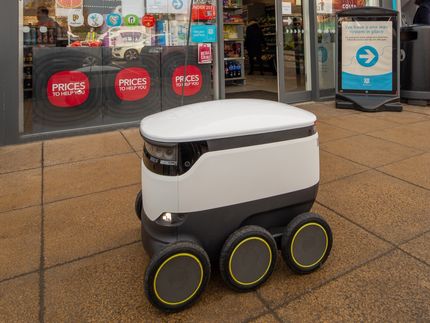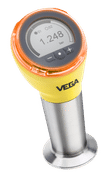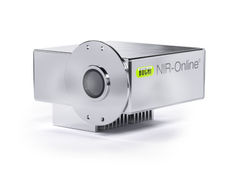Storage boxes should smell spoiled food
Using artificial senses to combat food waste
Advertisement
Keep-fresh boxes that provide information on how long their contents will remain edible and handy measuring devices that predict how long fruit and vegetables will remain fresh in the supermarket of the future: These are the concrete plans of a project in which the research team of sensor systems experts Andreas Schütze and Christian Bur from Saarland University is working together with European partners from science and industry. The aim is to waste less food.
Young researchers are also involved in the project. The European Commission is funding the project as part of the EU's Horizon framework program.
Is the soup from the weekend still good? What about the ham with the expired best-before date? And the raspberries: moldy or still ok? Questions like these arise millions of times in kitchens around the world. To avoid the risk of unpleasant consequences, tons of food are thrown away as a precaution. It's the same in supermarkets - here, too, huge quantities of fruit and vegetables are thrown away. If only we could get expert advice and have the food quickly checked on site to see how long it can actually still be eaten. - Impossible, you might think - but a Europe-wide team is actually working on making this possible.
"We are developing practical methods to monitor the quality of food. Specifically, these are an intelligent storage container that monitors its contents and a measuring device for supermarkets: simply by holding it over the crates, it should indicate exactly how long unpackaged fruit and vegetables are still fresh," explains measurement engineer Professor Andreas Schütze from Saarland University. This would help to ensure that less food ends up in the bin: If the storage can gives the green light for what has been stored, it will still be eaten. In the supermarket, sales can be better planned and salad or berries can be sold at a special price before they spoil.
Experts from various disciplines in science and industry are working together on this project. Ten partner institutions from Belgium, Germany, Italy and Spain are involved in the project called "Serenade": the Universities of Padova, Zaragoza, Leuven and Saarland, the Belgian research institute VITO and five companies. They are developing the smart aids, from the sensitive sensor system to the sustainable and dishwasher-safe materials.
The Saarbrücken researchers led by Andreas Schütze and Christian Bur, a doctor of engineering from Schütze's team, are working on the gas sensor system and the associated artificial intelligence: they are specialists when it comes to giving the technology an extremely fine sense of smell and teaching it to draw conclusions from what it sniffs. For some time now, they have been researching how to detect ripeness and spoilage using intelligent sensor systems. A previous project was funded by the German Federal Environmental Foundation (DBU).
It is well known that as food ages, it changes not only its appearance and taste, but also its smell. It is not for nothing that we instinctively smell food that we do not trust. If something smells sweet or even earthy, we quickly lose our appetite. The smell is related to the work of microorganisms such as bacteria, yeasts or molds that decompose and break down organic substances. It rots and ferments, becomes sour or rancid. All this is not without consequences for the environment: Volatile molecules are released into the air - such as ammonia, hydrogen sulphide, ethylene or acetic acid - initially in isolated amounts, but more and more as the process progresses.
Human noses can detect this thanks to millions of olfactory cells: When such odor molecules attach to them, the olfactory cells send this information to the brain so that it begins to interpret what this is all about. The artificial sensory organs of the Saarbrücken researchers in Andreas Schütze's team are already tracking down individual molecules among billions of air molecules: they fish out the ones that matter from a whole universe of irrelevant air molecules and gas particles. In doing so, they sniff out even more than human noses: "Our sensors also detect components such as ethylene or carbon dioxide that humans cannot smell," explains Andreas Schütze. The sensor system determines what the molecules are and in what concentration. To do this, the sensors collect the molecules over a certain period of time and then measure their quantity. "Semiconductor gas sensors based on metal oxide are used for this, which industrial partners in the project are also developing further. We are developing the sensor system on this basis. Over the course of numerous research projects, we have continued to refine the systems and their signal evaluation," explains Professor Schütze.
This makes it possible to identify the progression of spoilage - from the first signs of unproblematic ripening processes in the fruit itself to the point at which the composition of the collected particles signals that the food should no longer be eaten. "We don't just measure a concentration of the individual substances, but rather their concentration ratio in the air. This makes a big difference, because the measuring devices work independently of the quantity of odor molecules. They measure reliably even at a greater distance from the fruit and vegetables," explains Andreas Schütze.
"Odors leave a kind of personal fingerprint in the air, which is made up of different concentrations of various substances," says Christian Bur. "We want to read the respective condition of the food from the individual odor imprints. To do this, we assign the individual smellprints to the different states," adds the engineering scientist. In this way, the researchers are teaching the technology to assess the condition of the food and predict its deterioration using artificial intelligence. A "technical brain" evaluates everything, classifies what the sensors have sniffed out, draws appropriate conclusions and triggers corresponding actions - for example, showing the information "still fresh for five days" on a display. "To do this, we combine the microsensors with microelectronics and analytical components as well as machine learning methods," explains Christian Bur.
The research partners are working together on the various disciplines required to ensure that the storage containers and measuring devices are ready for series production at the end of the project. "This ranges from the evaluation of food decay and its prediction using artificial intelligence to the design and installation of new types of miniaturized gas chromatographs, which are connected upstream of the sensor technology to separate the air mixtures, through to the materials used that are suitable for everyday use," explains Christian Bur. Young researchers are also specifically involved in this project. "The task is international and interdisciplinary - ideal for interesting doctoral theses. We are training doctoral students in the network at the promising interface of food, sensors and materials technologies, some of whom are conducting research at the university and some in industrial practice," explains Professor Andreas Schütze.
The research is funded by the EU to the tune of 1.8 million euros as part of the HORIZON program "Marie Skodowska-Curie Doctoral Networks".
Note: This article has been translated using a computer system without human intervention. LUMITOS offers these automatic translations to present a wider range of current news. Since this article has been translated with automatic translation, it is possible that it contains errors in vocabulary, syntax or grammar. The original article in German can be found here.
Other news from the department science
These products might interest you
Most read news
More news from our other portals
See the theme worlds for related content
Artificial intelligence (AI) for food and beverages
Artificial intelligence (AI) is optimizing the food and beverage industry through automated quality control and more accurate demand forecasting. AI plays a particularly important role in product development by analyzing taste preferences and market trends. This allows new products to be developed that are better tailored to consumer needs, increasing efficiency and customer satisfaction.
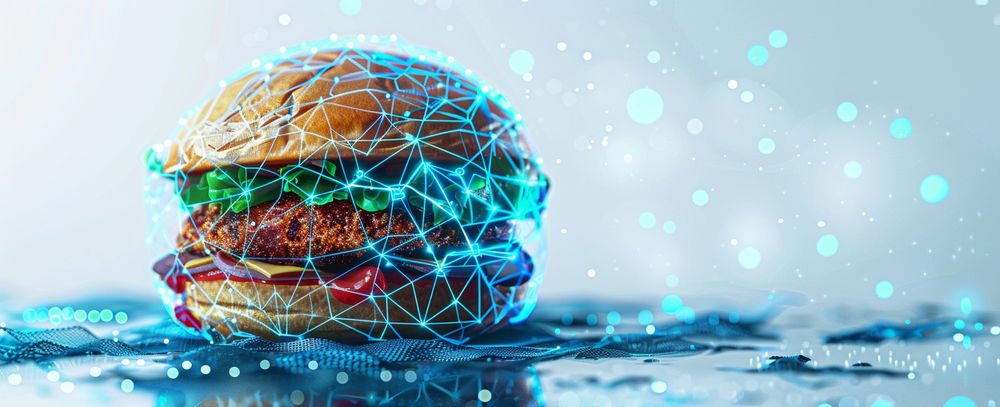
Artificial intelligence (AI) for food and beverages
Artificial intelligence (AI) is optimizing the food and beverage industry through automated quality control and more accurate demand forecasting. AI plays a particularly important role in product development by analyzing taste preferences and market trends. This allows new products to be developed that are better tailored to consumer needs, increasing efficiency and customer satisfaction.
